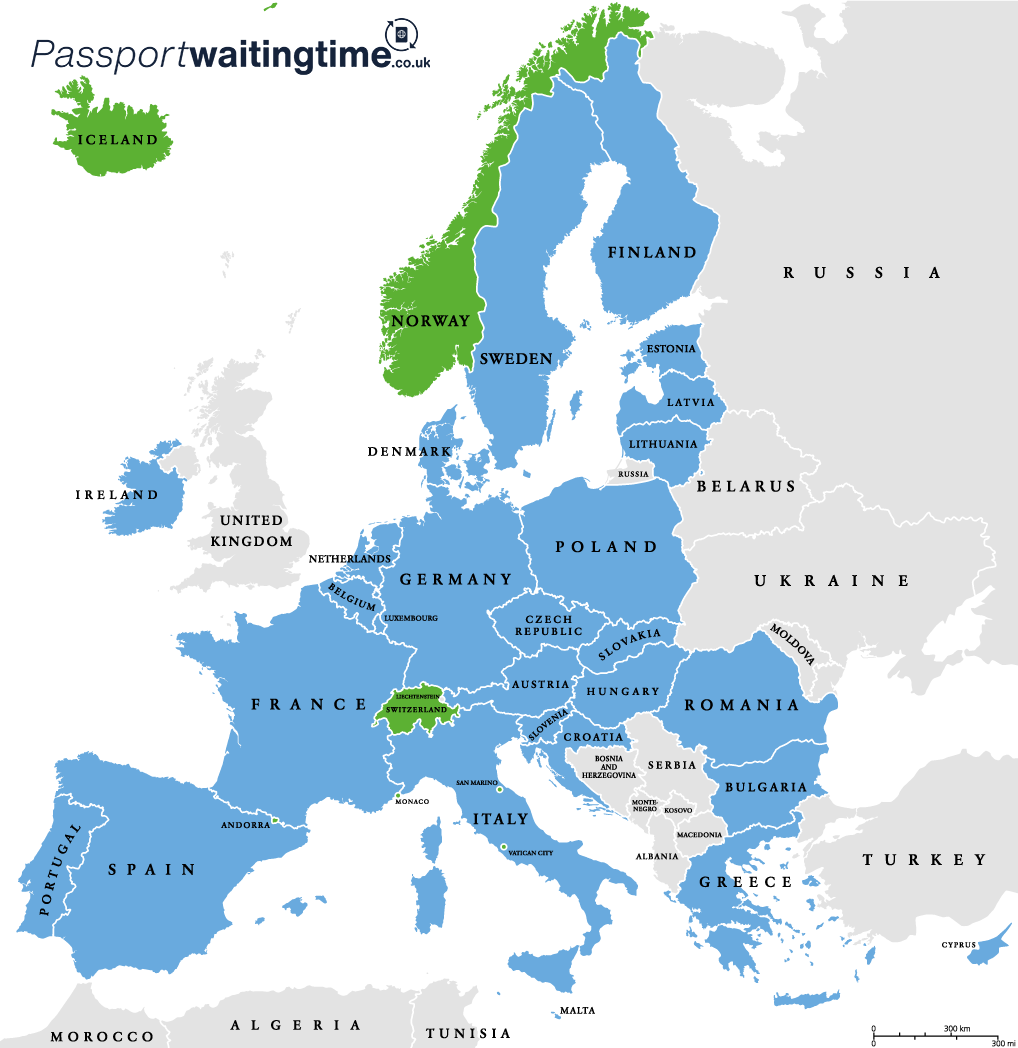Planning a trip from the UK to an EU country or other associated territories? Ensuring your passport meets the Schengen area passport requirements is crucial for a smooth and hassle-free journey. Here’s what you need to know about passport validity to make your travel experience stress-free.
In this article we answer:
Can I travel to Europe with less than 3 months on passport?
What is the 10 year passport rule?
Do I need a Passport for Ireland?
Can I travel to Spain if my passport expires in 3 months?
How do I know if the rules change?
Can I travel to Europe with less than 3 months on passport?
No. If you’re heading to an EU country (excluding Ireland) or specific European territories like Switzerland, Norway, Iceland, Liechtenstein, Andorra, Monaco, San Marino, or Vatican City, your passport must be valid for at least 3 months after the day you plan to leave (check the ‘expiry date’)
Full list of countries in the EU and those in the Shengen area where you require at least 3 months beyond the date you plan to leave.
- Andorra
- Austria
- Belgium
- Bulgaria
- Croatia
- Republic of Cyprus
- Czech Republic
- Denmark
- Estonia
- Finland
- France
- Germany
- Greece
- Hungary
- Iceland
- Italy
- Latvia
- Liechtenstein
- Lithuania
- Luxembourg
- Malta
- Monaco
- Netherlands
- Norway
- Poland
- Portugal
- Romania
- San Marino
- Slovakia
- Slovenia
- Spain
- Sweden
- Switzerland
- Vatican City
Key Point
- Your passport must remain valid for at least 3 months beyond the date you plan to leave. Confirm this by checking the ‘expiry date’ in your passport.

Key:
EU Countries – Passport must be valid for at least 3 months after the day you plan to leave (excluding Ireland).
Part of Schengen Area – Passport must be valid for at least 3 months after the day you plan to leave .
For all other countries shown on map you should check with UK Government foreign travel advice
What is the 10 year passport rule?
The issue of passports being valid for over 10 years arose due to a longstanding practice where individuals renewing their passports before expiration could carry over any remaining validity time from the previous document. Prior to September 2018, this meant that up to nine months could be added to the standard 10-year validity period, effectively extending the passport’s validity to a maximum of 10 years and nine months.
Travellers might inspect their passports, noting that the expiration date falls well beyond their intended return date, and assume all is in order. However, it’s crucial to also consider the date of issue. If the passport’s issuance date precedes the traveller’s entry date by more than 10 years, entry may be denied.
Key Point
- Your passport should have been issued less than 10 years before your planned entry date. Verify this by checking the ‘date of issue’ in your passport.
Pre-Travel Check: Before embarking on your journey, ensure your passport complies with these requirements. If your passport was issued before 1 October 2018, be aware that extra months might have been added to its expiry date.
Do I need a passport for Ireland?
According to UK foreign travel advice, as a British citizen, you are not required to possess a passport for entry into Ireland. Nevertheless, certain carriers and airlines may request identification. Irish immigration officials routinely inspect the identification of all passengers arriving by air from the UK and may request evidence of British nationality, especially if you were born outside the UK. It is advisable to carry your British passport with you. For guidance on acceptable forms of identification, consult the Ireland Citizens Information Board.
ID is not necessary for crossing the border between Northern Ireland and Ireland.
Related Article
How to get an Irish passport through your ancestry if you are British
Can I travel to Spain if my passport expires in 3 months?
As Spain is part of the EU and Schengen area your passport must be valid for at least 3 months after the day you plan to leave (check the ‘expiry date’). Therefore it is important that you check your passport well in advance before you visit Spain to ensure you meet the validity guidelines.
How do I know if the rules change?
Rules can change so it is important that you do all your final checks via the government website to be 100% sure. You can select you country on the UK Government foreign travel advice website and it will advise you on passport requirements along with any other travel advisories or restrictions.
Key takeaways:
Verify and Renew – It’s essential to confirm that your passport meets both the issue date and validity duration criteria. If you suspect your passport might fall short of these requirements, consider contacting the relevant embassy or consulates of your destination country for clarification. If necessary, renew your passport to ensure compliance before your trip.
Seek Assistance if Needed – Should you have any doubts or concerns about your passport’s compliance with the stipulated requirements, seeking guidance from the embassy or consulates of the country you plan to visit can provide clarity and guidance on necessary steps to take.
Plan Ahead for Renewal – To avoid any last-minute complications or travel disruptions, plan ahead for passport renewal if needed. Timely renewal ensures you meet the validity criteria well in advance of your travel date.
Understanding and adhering to these passport validity rules is pivotal for a seamless travel experience. By ensuring your passport meets the necessary criteria, you can mitigate potential issues and focus on enjoying your journey. Remember, passport validity rules may vary by country and can be subject to change. Always verify the latest requirements through official channels or embassy websites for up-to-date information tailored to your specific travel plans. Planning and preparation are key to a stress-free travel experience. Take the necessary steps to confirm your passport’s compliance with the Schengen area passport requirements well in advance of your travel date, and embark on your adventure with confidence!
Disclaimer: The information provided is based on guidelines available at the time of writing and may be subject to change. Always verify the latest requirements with the UK Government foreign travel advice service.





[…] Passport Validity Rules – Europe […]